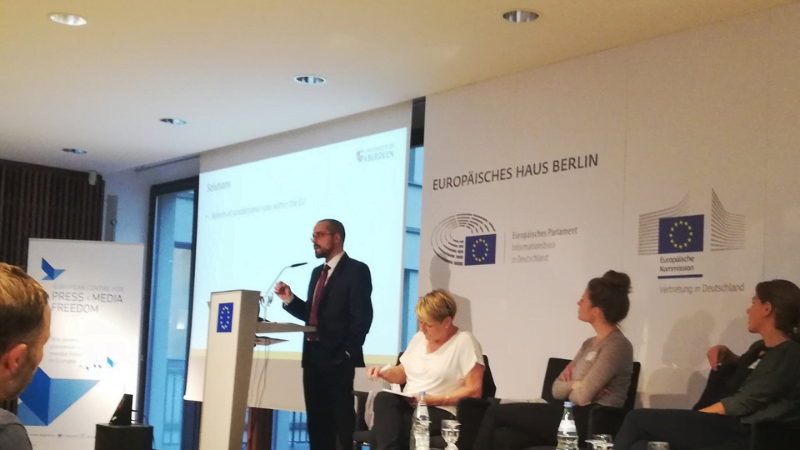Maltese law academic Justin Borg-Barthet, whose research has been instrumental towards the initiation of a process of legal reform related to SLAPP in the EU, has been appointed to the European Commission’s Expert Group Against SLAPP (Strategic Lawsuits Against Public Participation) – a problem that is hounding newsrooms throughout Europe and beyond.
The group has been set up as part of the EU’s European Democracy Action Plan and will advise the Commission on initiatives to combat SLAPP. These are financially crippling lawsuits filed in foreign jurisdictions by powerful business interests, often to silence a story.
Its principal tasks will be to advise the Commission on policy initiatives related to SLAPP, support the exchange and dissemination of practices and knowledge among practitioners on SLAPP-related issues and provide legal practitioners and practitioners’ associations with a forum to engage at the EU level.
In May last year, over 25 press freedom organisations and civic organisations wrote to the European Commission requesting reforms to EU law on defamation that were based on Borg-Barthet’s research. In August, he also published an academic paper on the urgent need for reform of EU defamation law, calling for a change in existing legislation and the introduction of new instruments.
Borg-Barthet dedicated the work to the memory of journalist Daphne Caruana Galizia who was facing over 40 pending libel cases before she was killed in 2017 most of which were filed by government officials and continue posthumously, a process described by her son Matthew as a “never-ending type of torture”.
My working paper on the reform of EU defamation law will be available later today. The paper calls for the reform of existing legislation and introduction of new instruments.
The work is dedicated to the memory of #DaphneCaruanaGalizia. Justice for Daphne demands legal reform. pic.twitter.com/DihxrX0Mnr
— Justin Borg-Barthet (@JustinBBarthet) August 18, 2020
SLAPPs are baseless or exaggerated lawsuits intended to censor, intimidate or silence critics by crippling them financially with the cost of a legal defence. The aim of SLAPP is not to win the case, rather, the procedure is initiated for the sole reason of having a procedure that tires out, consumes the financial and psychological resources of the defendants, and has as an ultimate goal of a chilling effect by discouraging potential critics from expressing their views.
The Shift and other Maltese media have also faced a number of SLAPP threats, the most recent coming from Turab Musayev, the Azerbaijani-British National who was SOCAR Trading’s representative on the Board of Electrogas, as well as a Russian banker and the Croatian behind the White Flag scam demanding that stories be taken down.
Borg-Barthet’s appointment comes a day after the European Parliament agreed to issue a report on having European Union rules to prevent SLAPP suits and appointed Maltese MEP and first Vice-President Roberta Metsola, a Member of the Civil Liberties Justice and Home Affairs Committee, as the rapporteur.
Metsola will lead efforts together with German S&D MEP Tiemo Wölken in a joint report aimed at getting as far-reaching an agreement as possible.














Congratulations Dr Borg Barthet.
You continue to engtrave the potential of a small island in contributing to a better Europe for everyone, where the pillar of the Fourth Estate continues to shield the principle of the freedom of the Press as the foundation stone of the real democratic credentials of the core objective of the founders of the Union.
This is a principle highlighted by Pope John Paul II in a moving speech he had made in the heydays of the Palermo mafia: “mountains start to fall when small stones start to move”.
One of those small stones is surely Malta, when represented by its principled academics